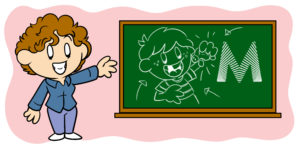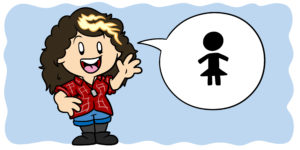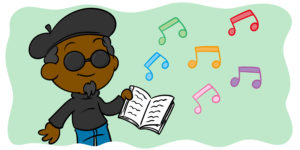Young Adult books are written for a readership aged 12-18, but there’s a certain magic to it that invites devotion from readers of all ages. YA fiction leads to movies that dominate the box office and is reviewed alongside the newest crime and thriller novels. Is it strange that books grouped solely by their readership’s adolescence have such a wide appeal amongst adults?
The answer to that question is the key to writing great YA fiction, but first the teens should get their proper respect.
Appreciating your audience
YA fiction is a strange genre. That’s fitting because it’s aimed at a strange demographic. The two things an author has to remember about a YA audience are:
1. You’re writing for the best readership there is
YA readers are ferociously literate, passionate about what they read, and combine the potential for childlike wonder with the attention to detail of adults. They haven’t heard it all before and you’ve got a good chance of being the best writer they’ve ever come across, at least until the next one. Your book could be a powerful force for self-discovery and help someone decide on the type of person they want to become.
2. You’re writing for the harshest readership there is
YA readers have absolutely no time to waste and a romanticized idea of cynicism that makes disliking something more impressive than enjoying it. They may embrace your work as a text key to their sense of self only to ritualistically damn it once they feel like being someone else.
There is only one sensible conclusion to these facts – you must write well. But what’s the key to doing so?
Understanding your audience
Writing for young adults means writing for people in an experimental, seemingly uncharted stage of their lives. It just so happens that that’s everyone over twelve. We may gain different perspectives and tastes as adults but we never totally lose that scary, exhilarating, lost-at-sea feeling that young adult fiction addresses so well.
A study by Bowker Market Research found that just under half (42.9%) of the audience for YA fiction is over 18. If you’ve used the train in the last sixteen years then you’ve seen someone in a suit reading Harry Potter (possibly a copy with the face saving ‘Adult Covers’).
Write for experience, not age
Why is great YA fiction so popular with adults? Because it addresses emotional experiences that begin in adolescence and never fully leave us. It’s these emotions that your fiction needs to address, rather than the age of your readership. The Hunger Games trilogy details Katniss Everdeen’s transformation into a powerful, self-possessed person despite being at the mercy of the fascistic nation Panem and its evil patriarch President Snow. Teens might see their parents or teachers in Snow whereas older readers may see bosses or real world political figures.
Think of the experiences and concepts that define adolescence for better or worse – isolation, identity, independence, burgeoning sexuality, social presence, power and sense of worth. These are the feelings you should try to evoke. They’re ideal for young adult readers because they are fresh, raw experiences but there’s no age where they stop being relevant themes.
This is why advice like ‘use slang’ or ‘reference pop culture’ is misleading. YA fiction has very little to do with age and trying to write ‘for teens’ will lead you down no end of false paths. Instead, acknowledge that you are writing for a group of people who are particularly curious and susceptible to an identifiable range of emotions. Exploring these emotions is the goal and writing relatable, enjoyable content for young adult readers will be the result. Trying to speak to da kidz is not da answer. Trying to speak to da kidz is never the answer.
So what IS the difference between YA and regular fiction?
In a word: pacing. Adults have had a long time to adjust to the feelings that begin in adolescence and they’ll accept a slow burn exploration of the subject. Adolescents who have found something that finally puts words to their immediate and overwhelming feelings are less patient. Young adult readers are the most voracious readers and it’s because they’re searching for something they need.
Young adult books need to be more streamlined, purer in their delivery, than regular fiction. The debris needs clearing out of the way so that it’s a clear sprint from beginning to end.
Justin Cronin’s The Passage begins by recounting the life of a protagonist’s mother, detailing how she was raised, how she got pregnant and how she raised her daughter. It’s a comment on how desperate and cruel the human condition can be, setting the tone for the rest of the story. In an adult novel, it’s right at home, but for a YA readership, it’s superfluous and stodgy. Nothing really happens, nothing really matters, and so it doesn’t count.
This issue can often be misunderstood as one of complexity but that couldn’t be more wrong. Adolescent readers love complexity; they love the independence of discovery. The Lord of the Rings is a favorite with YA readers because of, rather than despite, mass appendices and a specially invented language.
YA readers love investigating fictional worlds but the mistake many authors make is to dump the relevant information in the YA reader’s way. Things have to keep happening, you must keep up a fast pace, and so the trick is to slip extraneous information in where it fits or make it optional.
Appropriate content and being edgy
Young Adult literature can and should (be able to) touch any subject. YA literature is for YA readers, not their parents or teachers, and is a tool they can use to understand their experiences rather than a tool others can use to control them. Can YA fiction deal with any subject? Yes. Should it? It depends on the reader and the writer’s handling of the subject. There’s seldom merit to being graphic when dealing with violent or sexual themes in YA fiction but there are no concrete rules. Do remember, however, that sexual awakening is a different thing to sex as a fact of life.
Stephen Cole’s The Wereling uses a young female protagonist’s awareness of a boy sleeping in the next room to fantastic effect without ever suggesting anything physical.
The role of the YA writer is to provide the YA reader with entertainment and with content that can be used as a reference for their own experiences. Adolescence is an ‘edgy’ process, where readers are exploring their own boundaries and definitions. YA content can only be relevant to this aspect of adolescence if it joins them at the edges but that doesn’t mean every book has to do so.
S.E. Hinton’s The Outsiders deals realistically with drugs, sex and death and is a fantastic YA book. Tolkien’s The Hobbit deals with a gold hoarding dragon and is a fantastic YA book. As ever it’s a matter of individual choice and infinite variety.
Happy endings
A proudly cynical audience is resistant to a ‘happy’ ending. In the vast period of emotional upheaval that is adolescence, it’s difficult to believe that everything will turn out all right. The reader’s own period of upheaval isn’t over and so a happy ending leaves them behind and rings untrue.
A sense of hope is preferable, the potential for the world to get better at some point in the future. That’s why so many great YA series, such as The Hunger Games and the Wind on Fire trilogy, end with their protagonists still suffering from the events of the story but preparing to rebuild society. It’s a message many YA readers will appreciate hearing, although with that in mind…
Don’t preach
Try and think of yourself as a travel guide for life experiences. Feel free to tell your reader what other people like them have done, where they’ve gone and what the results have been. There’s nothing wrong with warning people of the dangers or the difficulties that lie ahead but if you tell them where to go, then you’re overstepping your boundaries by a mile and misunderstanding what they asked of you.
A travel guide that just says ‘DON’T GO HERE’ or ‘GO HERE INSTEAD’ is a waste of paper, which is exactly where the metaphor coincides with reality.
Don’t talk down
Again, if you’re writing for an emotional range rather than an age range, this shouldn’t be a problem. If you recognize that you’re talking to an audience preoccupied with independence and constructing their own identities then you’re less likely to patronize them.
Remember that vocabularies expand through reading so while showing off how many long words you know won’t win you any friends, there’s no virtue in dumbing down. If you’re worried that a YA audience won’t understand a term then consider providing context rather than replacing the word, just as you would with a term you’d made up. If readers can pick up ‘expelliarmus’ without missing a beat then they can cope with ‘effervescent’.
Your reward
Young Adult fiction can be a point of familiarity in an increasingly uncanny world. It can be a totem of identity and freedom, a vital stepping stone in someone’s imaginative journey, an act of intellectual rebellion, the start of someone’s library.
Young Adult fiction changes lives more than any other genre and has undoubtedly saved more than a few. Thankfully the research needed to write it is available to every author and as long as the needs of the audience, rather than their age, is in the forefront of your mind, you’ll have the ability to write a novel which is as vitally inspirational as it is enjoyable.






9 thoughts on “The Ultimate Guide To Writing Awesome Young Adult Books”
Thanks, I’d like to write as clear as you do, so… “Expelliarmus”! 😉
Thank you! That definitely helps me with my understanding to write.
I’ve read so many articles and books about writing and this might be the most helpful info I’ve come across about writing YA. Thanks so much for the inspiration and motivation.
Hi Nadia,
My pleasure, I’m really glad we could help.
Best,
Rob
One of my main weaknesses in my writing is my tendency to get preachy. I’d like to have messages in my stories, but I definitely do not want to command people on what to do. For example, I like tying political/social themes into my stories, but I know this can be a blockage for people who don’t agree with me, and I don’t want to turn away readers. I know many young adult novels DO include these themes without being considered preachy. I read your piece on not letting your opinion take center stage in your writing, but I was wondering if there were more specific tips for writing young adult books. Do you have recommendations for how I can include political themes without coming across as preachy or controlling?
Hi Juliette,
My best tip would be to ensure that all opinions and messages – when shared explicitly – should be put in the mouths of characters. If the narrator is sharing an opinion (especially if the story is in the third person) there’s no way for readers who disagree – or who just need persuading – to engage comfortably with what’s going on. I’d recommend the article below on this topic.
//www.standoutbooks.com/sez-who/
Another trick is to ensure the reader grasps and wants to solve the problem before you present the solution. If they’re really hoping for a solution then when you finally provide one, it’s far more tool than sermon. The idea is that they’re thinking, ‘Oh, if only X could be fixed’, which means you get to enter with ‘Y would stop X: here’s how’.
You want this desire to be visceral – you can’t just say there’s a problem; they have to conclude there’s a problem by seeing the suffering it causes. In the Hunger Games books, for example, Katniss suffers endlessly, and the reader wants that to stop. The story then explains the system that’s causing her suffering – helping the reader see what needs to change – and finally introduces a potential solution. This is one of the reasons YA tends to have a protagonist discover the problem and then join an existing resistance – it means you get to show the problem first and then introduce a workable solution (as opposed to the protagonist having to form a resistance from whole cloth).
Best,
Rob
Thank you, this really helps! I’ll definitely try out your advice. I’m going to hunt through the book for any pure opinion statements, and I’ll do what you said (work on showing and interacting with the problem instead of just stating it). I’ll also put in some gray areas since no problem has a perfect solution. Once again, thank you for the advice. I love your articles!
Hi Juliette,
My pleasure, glad I could help.
– Rob
You make points I hadn’t considered about the YA genre and the relationship between the reader and YA fiction. Thanks!